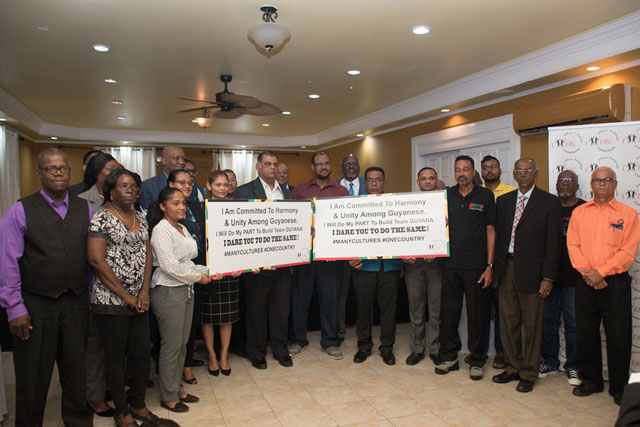The 11 political parties, which have been approved to contest the March 2, 2020 elections, yesterday signed a Code of Conduct under the auspices of the Ethnic Relations Commission (ERC).
The three-page code calls on those aspiring to lead Guyana to respect those aspects of its constitution which allow for political activity free from discrimination and intimidation.
Specifically the parties have agreed to uphold Articles 38 (G), 146, 147, 149 and 160A of the constitution. These articles prescribe that the public service shall be free from political influence, offer protection for freedom expression, assembly, association and demonstration as well as offer protection from discrimination based on factors such as race and gender. Further they prohibit political parties or their agents from causing ethnic division.
The Code also makes reference to the Racial Hostility Act and the Representation of the People Act both of which also list prohibited activities before, during and after an election cycle.
2020 marks the first time that the Code is being implemented by the ERC as it is usually the Guyana Elections Commission (GECOM) which administers all aspects of election management in Guyana.
Rev John Smith who chairs the ERC told those gathered at the Georgetown Club to witness the signing that the commission’s oversight of the Code is “unavoidable”
“We believe that as a constitutional body birthed out of political discord and one that is entrusted with the promotion of harmony and good relations…such an endeavour becomes unavoidable,” he noted, adding that the Code itself is in the best interest of the country and its people.
He however lamented that internal reports compiled from monitoring public meetings and the traditional and non-traditional media, including Facebook, are major cause for concern.
According to Smith there have already been “behaviour and utterances not helpful to the efforts of promoting harmony.”
He later clarified for media operatives, that due to the content of the mentioned internal reports, the ERC has written to the leadership of the two major parties, A Partnership for National Unity/Alliance for Change (APNU+AFC) and the People’s Progressive Party/Civic (PPP/C) pointing out what they have deemed to be unhelpful to the process of fostering harmony. The Commission has also made recommendations for mitigation.
Public displays
“We urge all to work towards eliminating such public displays through a more responsible approach in an effort to ensure that the remaining period of the campaign is free of ethnic division, discrimination, hate speech, incitement and provocation. This must be extended throughout Election Day and beyond,” he said, stressing that the efforts invested by all be reflected in adherence to the spirit and intent of the Code of Conduct.
The code urges parties to reject the use of violence and intimidation during the campaign, on Election Day and after the results are announced.
As part of this action parties are urged to forbid all actions aimed at removing, defacing, besmirching or altering any flag, banner, poster, notice or other campaign materials of other political party. They are also urged to forbid the use of any form of intimidation while parties are announcing their activities or holding their meetings, gatherings and rallies.
APNU General Secretary, Joseph Harmon, who along with AFC Executive Raphael Trotman signed the Code on behalf of their coalition, has already had to publicly condemn such acts on the part of party supporters following an incident at Laing Avenue.
Speaking on behalf of his coalition, Harmon said that they are committed to the code and have circulated to candidates a guide for public speaking which includes some of the tenets in the code.
He stressed that the party was very happy to sign the agreement which though birthed out of political discord has been realized via political discourse and augurs a new period of political understanding.
PPP/C Executive Secretary Zulfikar Mustapha, shared similar sentiments stating that his party guards the right of every Guyanese to participate in free and fair elections.
He stressed that their presence at the signing reiterates their commitment for elections to be held free and fair and in an environment which is free of intimidation and violence. Meanwhile as the smaller parties took the opportunity to air their concerns, the Commission was presented with its first major hurdle.
A frustrated Phyllis Jordan, Presidential Candidate of the People’s Republican Party (PRP), lamented that her party was being targeted on social media.
According to Jordan due to financial constraints and other considerations her party has chosen to use social media as their main campaign tool.
“We decided to use social media only to find out some mischievous persons have reported us to Facebook and now the ability of us to boost our ads has been completely disabled,” she shared.
As the representatives of the United Republican Party (URP) cheered and supported her complaint, Jordan said that there appears to be discrimination in the political landscape against small political parties.
“We should have a fair opportunity to get our message to the people of Guyana,” Jordan said, adding that there is no hate speech in their campaigning.
She stressed that while they have lodged complaints with GECOM there has been no positive action.





